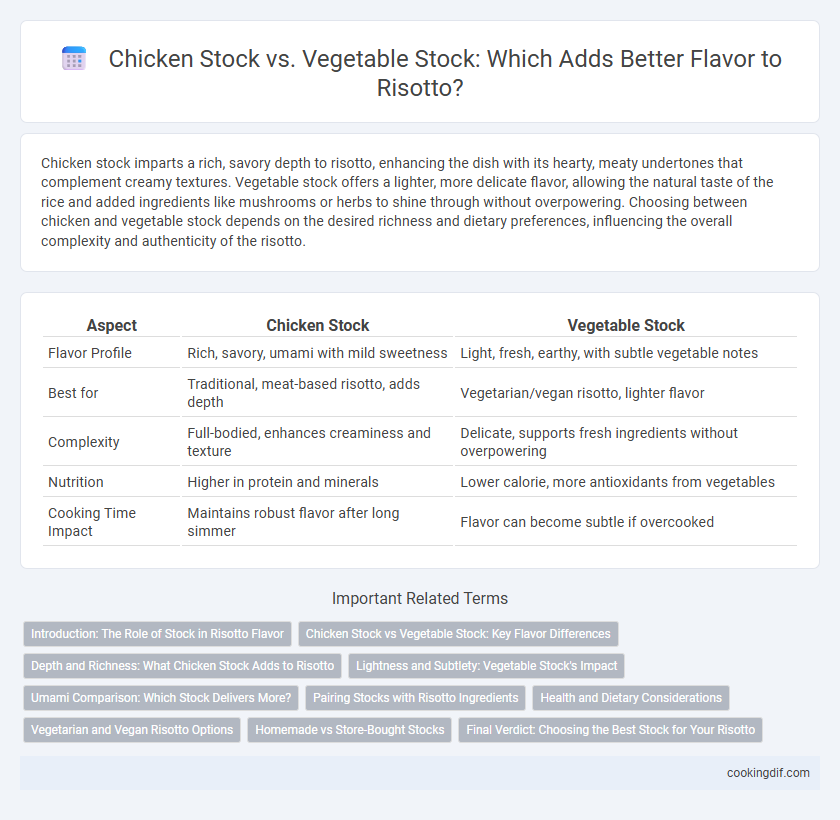Chicken stock imparts a rich, savory depth to risotto, enhancing the dish with its hearty, meaty undertones that complement creamy textures. Vegetable stock offers a lighter, more delicate flavor, allowing the natural taste of the rice and added ingredients like mushrooms or herbs to shine through without overpowering. Choosing between chicken and vegetable stock depends on the desired richness and dietary preferences, influencing the overall complexity and authenticity of the risotto.
Table of Comparison
| Aspect | Chicken Stock | Vegetable Stock |
|---|---|---|
| Flavor Profile | Rich, savory, umami with mild sweetness | Light, fresh, earthy, with subtle vegetable notes |
| Best for | Traditional, meat-based risotto, adds depth | Vegetarian/vegan risotto, lighter flavor |
| Complexity | Full-bodied, enhances creaminess and texture | Delicate, supports fresh ingredients without overpowering |
| Nutrition | Higher in protein and minerals | Lower calorie, more antioxidants from vegetables |
| Cooking Time Impact | Maintains robust flavor after long simmer | Flavor can become subtle if overcooked |
Introduction: The Role of Stock in Risotto Flavor
Chicken stock imparts a rich, savory depth and subtle sweetness that enhances the creamy texture of risotto, making each bite more flavorful and hearty. Vegetable stock offers a lighter, fresher base with delicate herbal notes, ideal for vegetarian risottos where a clean, balanced taste is desired. The choice between chicken and vegetable stock significantly influences the overall flavor profile, affecting the dish's complexity and aroma.
Chicken Stock vs Vegetable Stock: Key Flavor Differences
Chicken stock imparts a rich, savory depth and slightly fatty mouthfeel that enhances risotto's creaminess with umami notes from simmered bones and meat. Vegetable stock offers a lighter, more delicate flavor profile, emphasizing freshness and subtle sweetness from vegetables like carrots, celery, and onions while maintaining a clean finish. Choosing chicken stock intensifies the risotto's hearty character, whereas vegetable stock highlights the dish's natural grain and vegetable ingredients for a more nuanced, plant-based taste.
Depth and Richness: What Chicken Stock Adds to Risotto
Chicken stock enriches risotto with a deep, savory flavor profile that vegetable stock often lacks, providing a robust umami foundation essential for traditional recipes. The collagen and fats in chicken stock enhance the creamy texture, creating a richer mouthfeel that elevates each bite. Using chicken stock imparts a subtle complexity and warmth, intensifying the overall depth and making the risotto more satisfying and full-bodied.
Lightness and Subtlety: Vegetable Stock's Impact
Vegetable stock imparts a lightness and subtlety to risotto that enhances its delicate flavors without overpowering the dish. Its gentle aroma and mild taste allow the rice and other ingredients to shine, creating a balanced and nuanced profile. Using vegetable stock is ideal for maintaining a fresh and clean palate, especially in vegan or lighter risotto variations.
Umami Comparison: Which Stock Delivers More?
Chicken stock typically delivers a richer umami flavor in risotto due to its higher concentration of amino acids like glutamate, enhancing the dish's savory depth. Vegetable stock, while lighter and more subtle, offers umami primarily through ingredients like mushrooms and seaweed but generally produces a milder taste. For a pronounced savory complexity, chicken stock remains the preferred choice, although vegetable stock suits vegetarian variations seeking a balanced but less intense umami profile.
Pairing Stocks with Risotto Ingredients
Chicken stock provides a rich, savory base that enhances the creaminess of risotto, complementing earthy ingredients like mushrooms and roasted vegetables. Vegetable stock offers a lighter, more delicate flavor profile, making it ideal for risottos featuring fresh herbs, asparagus, or peas. Selecting stock based on the main risotto ingredients ensures balanced flavor development and elevates the overall dish.
Health and Dietary Considerations
Chicken stock provides a richer umami flavor and higher protein content, beneficial for those seeking added nutrition but unsuitable for vegetarians or vegans. Vegetable stock offers a lighter, more neutral base, ideal for plant-based diets and individuals with dietary restrictions such as low sodium or allergens. Choosing between them impacts risotto's taste profile and aligns with health goals like reducing saturated fat intake or adhering to ethical eating preferences.
Vegetarian and Vegan Risotto Options
Vegetable stock enhances risotto with a light, fresh flavor ideal for vegetarian and vegan options, allowing the natural taste of ingredients like mushrooms, asparagus, or squash to shine. Chicken stock provides a richer, deeper umami profile, but may overpower delicate plant-based flavors and is unsuitable for strict plant-based diets. Choosing vegetable stock ensures a flavorful, meat-free risotto that accommodates vegan dietary preferences while maintaining creamy texture and depth.
Homemade vs Store-Bought Stocks
Homemade chicken stock provides a rich depth of flavor to risotto, with natural collagen that enhances the creamy texture and savory profile, while store-bought versions often contain additives that can dilute taste complexity. Vegetable stock, whether homemade or store-bought, offers a lighter, earthier base but lacks the umami intensity and mouthfeel contributed by chicken stock's gelatin content. Choosing fresh, homemade stock ensures optimal control over seasoning and ingredient quality, significantly elevating the risotto's overall taste experience.
Final Verdict: Choosing the Best Stock for Your Risotto
Chicken stock offers a richer, more robust flavor that enhances the creamy texture and depth of traditional risotto, making it ideal for meat-based or hearty vegetable dishes. Vegetable stock provides a lighter, more delicate base, perfect for vegan or lighter risottos, allowing the subtle flavors of fresh vegetables and herbs to shine through. Selecting the best stock depends on desired flavor intensity and dietary preferences, with chicken stock delivering boldness and vegetable stock offering versatility.
Chicken Stock vs Vegetable Stock for risotto flavor Infographic

 cookingdif.com
cookingdif.com